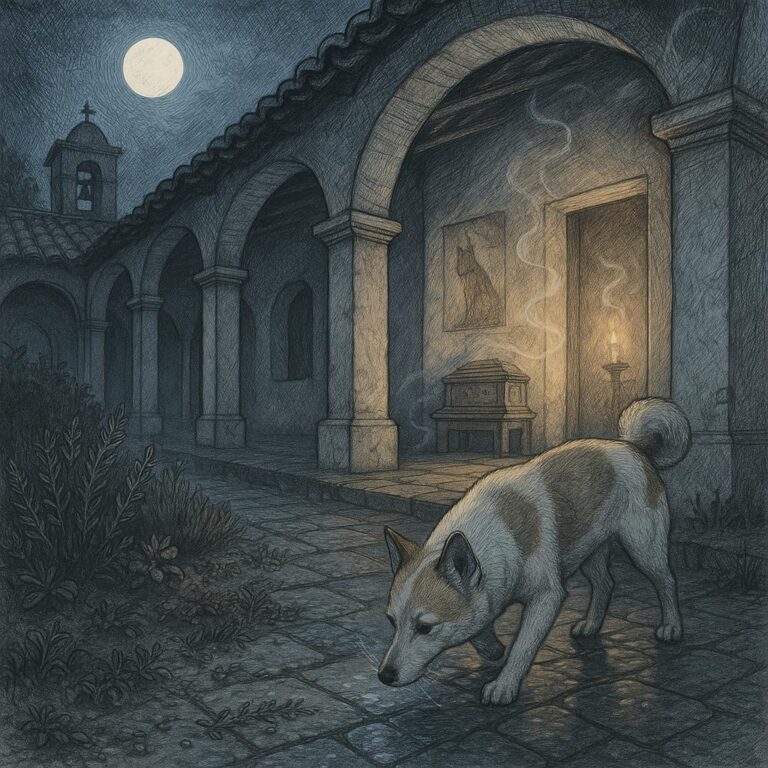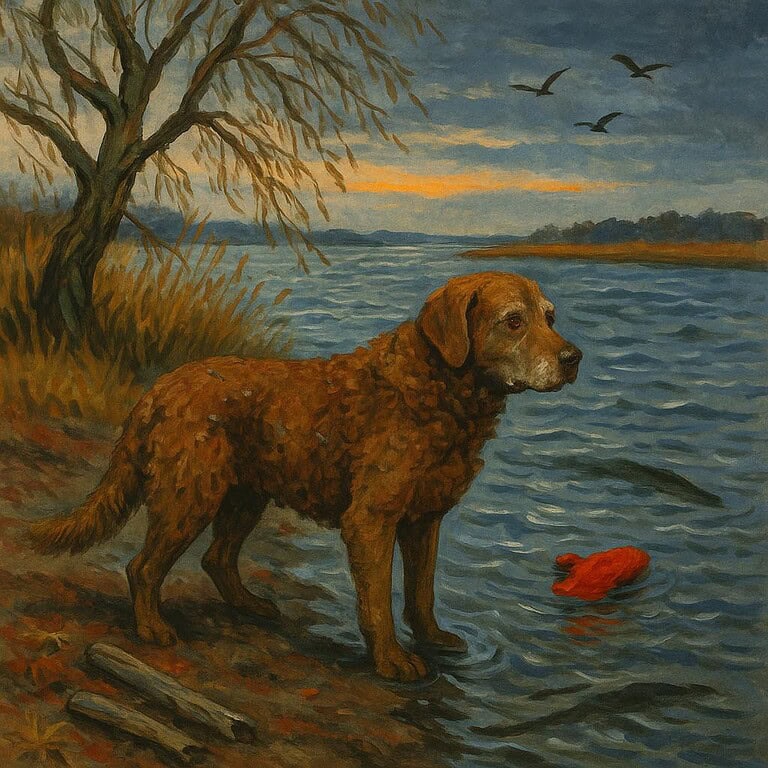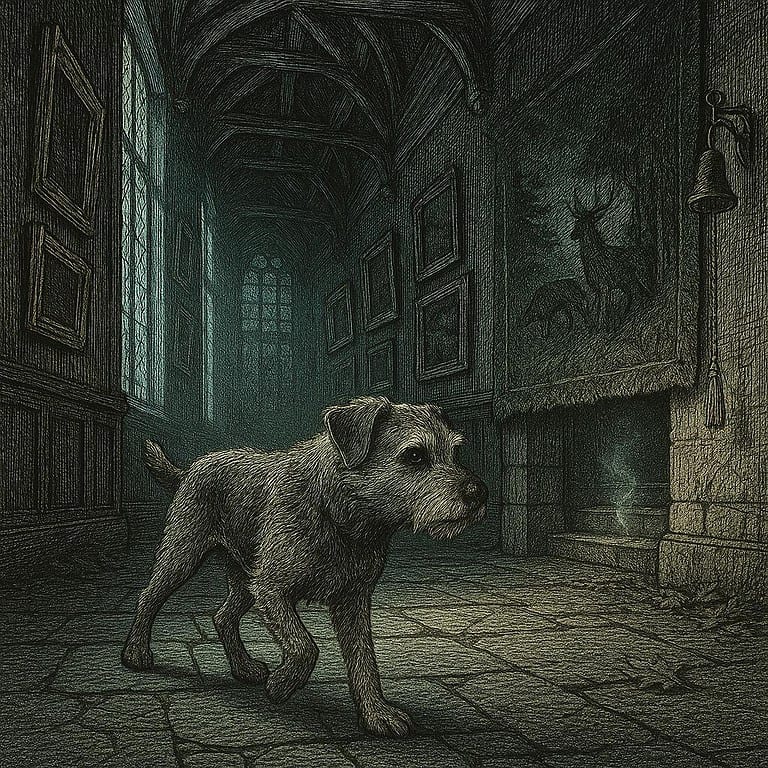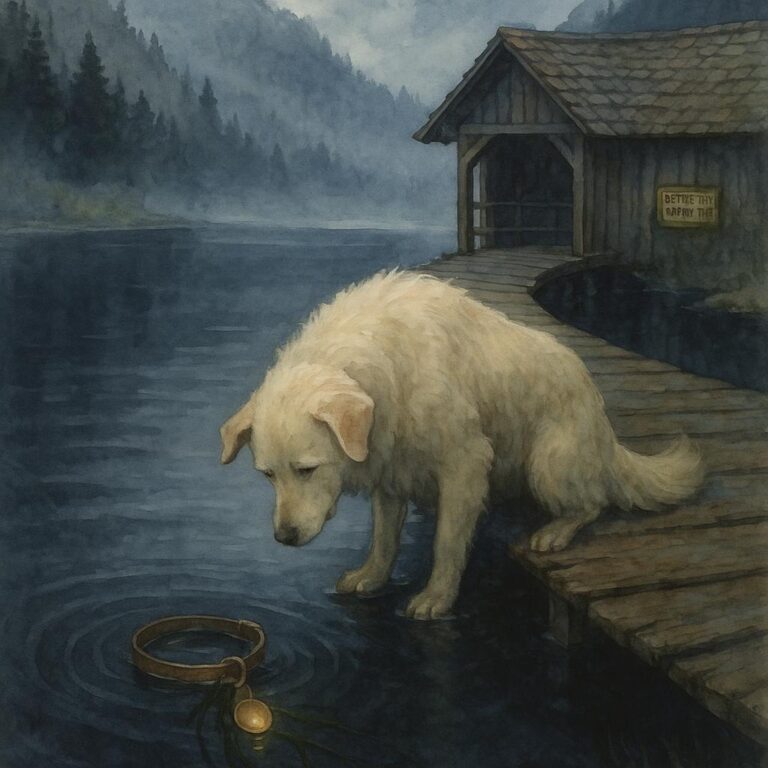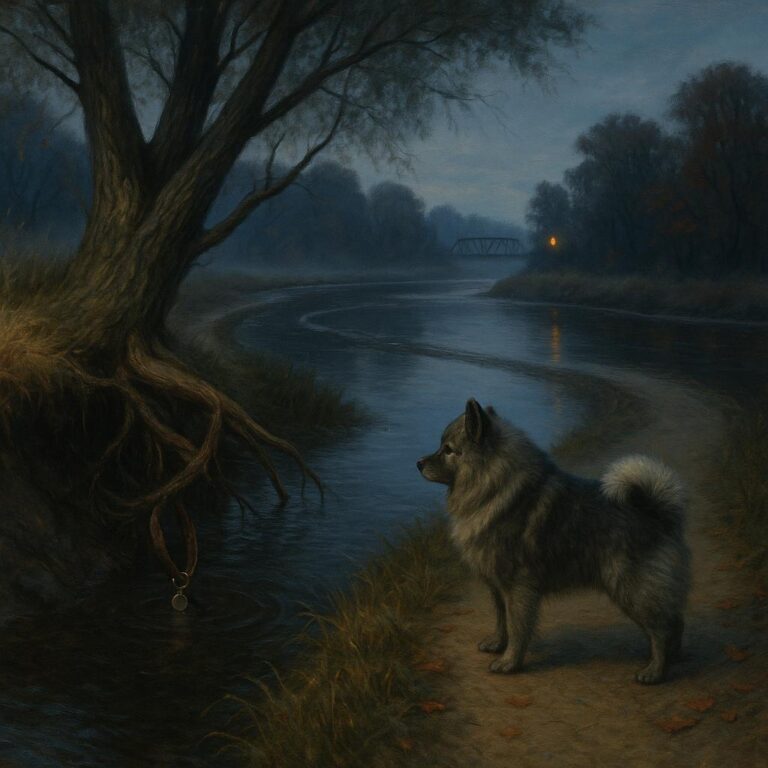Amber Hush

In the amber hush of prairie dusk, Fable, a fifteen-year-old Danish-Swedish Farmdog, wove through seedheads that brushed his gray muzzle. He felt her in the wind again, warm-vanilla and clover, the scent that meant Ruth, the only heart that made his chest quicken. He followed it like a vow, ears tilting to the cricket-stitched silence. Stars salted the big sky. A bell chimed ahead, the same sweet note from the day at the gate. Fable paused, tail trembling, then shouldered into the grass as a shape rose and the bell suddenly stopped.
The grass opened in a hush, and the world narrowed to the ribbon of scent and the place where it ended. He could taste it as much as smell it—warm-vanilla, clover, the ghost of flour and lard that had lived in her sweater cuffs—and his old body forgot to ache. Fable lifted each paw high through the thicket, careful as a fox and shameless as a pup, moving because moving was the only true prayer he had ever learned.
The bell had rung just once, a single silver note that had always meant come home. He’d known that sound from the first week, when he was small and the gate was taller than all the stories in him, and Ruth had laughed and let the bell kiss the wood just for him. That day he’d stood with seedheads in his whiskers and the new name shining in Ruth’s mouth, and he had answered it with his whole body. He answered now.
The shape rose as he broke into the clearing—soft-shouldered, a bend of darkness against starlight. The bell went quiet because a hand had found it. He knew that pause in air, the way it held itself; he knew before he had breath to scent it. The wind gave him her full, and everything in him made a sound.
Fable’s tail seemed to wake first, a thump in grass, then his spine tugging him forward, then the careful lift of paws became a trot that his joints protested and he ignored. He reached her at the old fence line where the posts leaned like tired horses. The gate leaned too, as if the prairie had been telling it bedtime stories for years. The bell, small and brass, was looped on a nail where Ruth’s hand had always left it. Her hand cupped it now, palm warm under metal warmed by sun that was gone.
He nosed her wrist, because noses do not lie. The vanilla lived there. Clover curled at the cuff. He found the marrow-deep calm that belonged to Ruth alone, and he pressed the long length of his face into the tendons and breathed and breathed until the world steadied.
“Fable,” she said, in the voice that had a nap to it, as if every word could hold a nap and a plate of biscuits if you needed one. It brushed his ears, set them tight to his skull and then lifting again.
He offered her his chest the way he always had—leaning hard into her shins until she had no choice but to brace and rub. She laughed under her breath at the old trick, and her fingers were what they had always been: knowing the place behind his shoulder where the itch was true, the rub that told his heart to slow, the long glide from ear to muzzle that had fixed a hundred thunderstorms and one foolish encounter with a porcupine. His back legs folded without instruction. He coughed, shook it off. He was fifteen and bones, he was silt and stubbornness, he was the dog who would walk Ruth to the ends of the earth even if the path was only three steps.
Around them the darkness gathered in a kind way. Fireflies made brief prayers in the ditch. A nightjar stitched itself from one fencepost to the next. Far off, a tractor ticked into cooling. Close up, Fable could hear the little syllables of Ruth’s breath between her words, and he began to match them. This, too, was a thing he knew how to do.
“You took your time,” she murmured, low. Not scolding. A smile around the edges of it.
He answered with a soft mouth, taking her fingers between his teeth like the old days when she’d let him carry the hems of things. His tail drummed the grass again, silly and solemn at once. He let go when she let the bell go, and it chimed again, a bright seed dropped into the night.
The sound lifted a memory so clean it felt like water. The day at the gate when the world had been new and his legs too much. Rain had been coming, corrugating the sky, and Ruth had set the bell swinging with a flick and said, “Well then, Fable,” as if his name had been true before it was spoken. He had come and pressed his wet flanks to her calves and watched the storm run along the earth like a dog, and from then on, he had believed in bells. He had believed in gates, and in the way Ruth’s hand could turn any door into the right one.
She stepped now, just enough to put the gate between his ribs and hers, and laid her palm on the top board. The wood was smooth where years of hands had found it. He lifted a paw and set it on the lower board, an old, funny habit: See? I am helping.
“You have,” she said, and the bell on its nail answered with a small respectful kiss, a thing like agreement.
He ducked under as she pulled the gate inward. It complained with a hinge squeal that might once have been a scold and now was more like relief. He wriggled his hips to get his tail through without knocking anything loose, because even now he was careful with Ruth’s things, and then he was inside a circle of yard that smelled like tomatoes and thyme and sun-cooked rope. The porch loomed dark and familiar. The steps remembered the rhythm of his paws; the boards answered with all the old hollow notes. Somewhere a moth snuffed its wish against the porch light that wasn’t lit. He paused and turned back because the business of making sure was part of him.
She was at the threshold, hand on the gate, eyes soft. He couldn’t see the color of them in the night, but he knew their warmth, the way they caught on him and made of his plain dog self a whole story.
“Come on,” Ruth said. Not a command. A friendship.
He went, the way he had always gone. Up the steps. The door opened to the house he knew, and it opened also to the house under the house—the one made of soap and bread and river water and first snow and doorways. Air that had no shadow in it breathed around his face. His nose filled with everything that had ever mattered.
On the rug, the red one that had faded to a soft russet from boots and summers, he circled the long, careful, perfect circle of a dog who has found a bed that is his, and he laid himself down. His elbows went first, then his chest with a small grunt, then his chin. Ruth’s hand found his head. He lifted it once to get the weight exactly where it belonged beneath her palm, then settled. Back legs tucked themselves in, businesslike. He was a map that had folded along all its old creases.
Outside, prairie night worked at its endless sewing. The bell, left to itself, gave one last tremor, a silver syllable that went up into the rafters and then loosened into the stars. Fable listened to it because he was thorough with listening. He tasted clover and warm-vanilla and summer rope, and the sounds went a little farther away, as if they were practicing leaving without hurry. He felt the slow dog-pleasure of being without watch, and he let his breath find Ruth’s as if it were a path in grass.
He had followed a thousand small invitations—the rattle of a scoop on the kibble bin, the clink of a leash, the murmur of his name, the bell at the gate. This one was like those, only simpler, and he answered it with the same thing he always had: himself, whole. He did not think of words; he thought of her hand and the way the world was when her hand was on him. He held that shape.
The rug remembered him. The house breathed like sleep. Ruth leaned her shoulder against the couch and adjusted his ear so it wouldn’t crease. He closed his eyes on stars and opened them on nothing but ease.
He went where she went.

